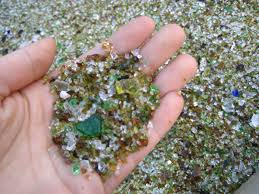
Driving on glass being studied by Quebec researchers
By On-Site Magazine
Asphalt Construction Construction Materials Green Construction Infrastructure LEED asphalt construction École de technologie supérieure infrastructure Montreal recycled glass research road buildingRecycled glass could be added to hot mix asphalt for multiple benefits
The glass Quebec residents put in their blue boxes could find new life in a future municipal road or highway.
 A research study is now underway to develop innovative applications that integrate recycled glass in road construction. The partners in the project include the École de technologie supérieure (ÉTS), City of Montréal, Société des alcools du Québec (SAQ), Éco Entreprises Québec (ÉEQ) and RECYC-QUÉBEC.
A research study is now underway to develop innovative applications that integrate recycled glass in road construction. The partners in the project include the École de technologie supérieure (ÉTS), City of Montréal, Société des alcools du Québec (SAQ), Éco Entreprises Québec (ÉEQ) and RECYC-QUÉBEC.
This common commitment will provide ÉTS with $450,000 in funding over three years to conduct studies and laboratory tests on road infrastructures. The Mitacs-Accélération intern program will contribute $220,000 more to that amount. The research project will focus on developing materials that are more durable and environmentally friendly, while giving a second life to the glass containers Quebecers place in recycling bins. Test slabs offered by the City of Montréal will allow for evaluating the performance of asphalt mixes containing recycled glass.
“The joint ÉTS, SAQ, City of Montréal, ÉEQ and RECYC-QUÉBEC project is an initiative that demonstrates Quebec’s expertise in addressing climate change. Integrating glass in road component manufacturing is a concrete solution towards lowering GHG emissions and adapting our actions to the impact transportation has on climate change,” said Robert Poëti, Minister of Transport and Minister responsible for the Montréal region.
In this project, Michel Vaillancourt and collaborators Alan Carter and Daniel Perraton, all professors at École de technologie supérieure, will look into how post-consumer glass components affect the performance of asphalt mixes and other materials used in road construction.
The research team expects that the glass integrated in asphalt will improve drainage and insulation qualities, therefore resulting in a longer service life for our roads.
In addition, at the end of the project, ÉTS expects that integrating glass will help reduce greenhouse gas (GHG) emissions generated during asphalt manufacturing. Those are only a few of the points currently under study by the ÉTS research team.
“At ÉTS, we put engineering at the service of industry: over 60 per cent of our research funds come from partnerships with public, private and non-profit organizations, which is quite rare in the academic field,” said Pierre Dumouchel, General Manager of ÉTS. “This initiative is yet another in the series, and we are very proud to participate in the development of concrete solutions to several environmental, economic and social challenges.”
“The City of Montréal is pleased to cooperate with ÉTS in this applied research project to integrate recycled glass. Using post-consumer materials as environmentally-friendly components to improve construction material performance is a priority for our Administration. Dealing with climate change and greenhouse gases requires a range of actions, and making new materials with recycled glass is a very promising avenue. We are proud to offer financial support and test slabs to try out these new materials,” remarked Lionel Perez, City of Montréal Executive Committee Member in charge of infrastructures, the Commission des Services Électriques, governance and democracy and governmental relations.
ÉTS plans on testing its new asphalt mixes on Montréal test slabs in 2017.




